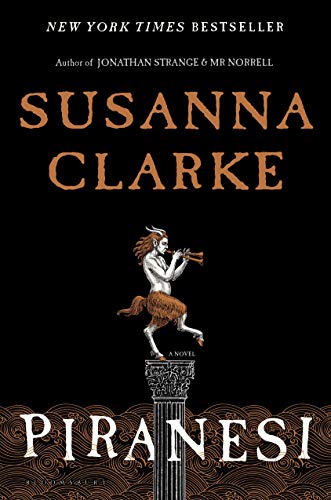
Synopsis
The House is the World. Countless halls line up, staircase to staircase, vestibule to vestibule. While on the lower floor the tides roar and on the upper floor the rooms are impenetrable by cloud fog, it is reasonably safe on the middle floor. Only birds and fish populate the World, along with fifteen people: 13 Dead, Piranesi and The Other.
The days are similar, only the weather changes with the seasons. But then something invades the World and Piranesi must face a change.
Review
The book captivated me from the first page. At the side of Piranesi, who regularly goes on exploratory tours, we first get to know the house and its peculiarities. The author does a masterful job of presenting Piranesi’s world to the mind’s eye. One has the gigantic halls and the imposing statues right before one’s eyes. At the same time, Susanna Clarke’s writing style is also beautifully poetic, but doesn’t feel campy or too flowery. One loses oneself in this book. Struggles mentally along the corridors, accompanied only by the sound of the waves and the song of the birds, besides fish and shells the only animals in the house. The book is pure deceleration.
“The Beauty of the House is immeasurable; its Kindness infinite.”
At the same time, it is also incredibly exciting, because the house has many secrets. The author skillfully gives us clues, leads us along through the book, but also gives us time to linger and ponder with Piranesi about life, death and everything in between. Reading the book is like being under a spell, and when you slam it shut at the end, you feel as if you’ve awoken from a dream from which the sound of wings flapping and footsteps in vast halls still resonates.
“In my mind are all the tides, their seasons, their ebbs and their flows. In my mind are all the halls, the endless procession of them, the intricate pathways. When this world becomes too much for me, when I grow tired of the noise and the dirt and the people, I close my eyes and I name a particular vestibule to myself; then I name a hall.”
Piranesi spends his days exploring these halls and has also begun to deal with The House as his World, where he connects events with himself and his destiny. I found this beautiful because it shows how connected he feels to “his world” and, as he himself says, the world speaks to him and sends him signs, for a better understanding. Exploring what is behind the borders, discovering the special knowledge that is supposed to be hidden in this house, is his primary goal; however, this was given to him by The Other. The only living other person he meets. The purpose of this quest is explained in the very first pages and shows the typical aspirations that many people have been striving to unravel for a long time: Immortality, telepathy, power, to name a few.
“It does not matter that you do not understand the reason. You are the Beloved Child of the House. Be comforted. And I am comforted.”
Piranesi reports all this in his diary entries and I must confess that on the first pages I was not quite convinced whether I would like the way of storytelling. His descriptions are very influenced by the localities, since they are his only orientation and the numbering of the halls and signposts was a bit too much for me at first. Then, however, there is a pull that has not let me go and also a tension that is stoked by the interests of The Other. He visits Piranesi regularly and expects support from him in his search for “knowledge”. The brief moments of these meetings, however, quickly reveal that his intention is rather cold calculation than friendly cooperation.
“May your Paths be safe, your Floors unbroken and may the House fill your eyes with Beauty.”
This is an extremely fascinating story that has a thrilling resolution in store, but it has the appeal of not revealing everything completely. This house carries a lot of secrets and trying to unravel them all would destroy the magic of this place. Anyway, the hints about it were enough for me to get an idea about it and I enjoyed listening to Piranesi’s thoughts, which bring you closer to yourself again.
“I can see that it is in the nature of men to prefer one thing to another, to find one thing more meaningful than another.”






Leave a Reply